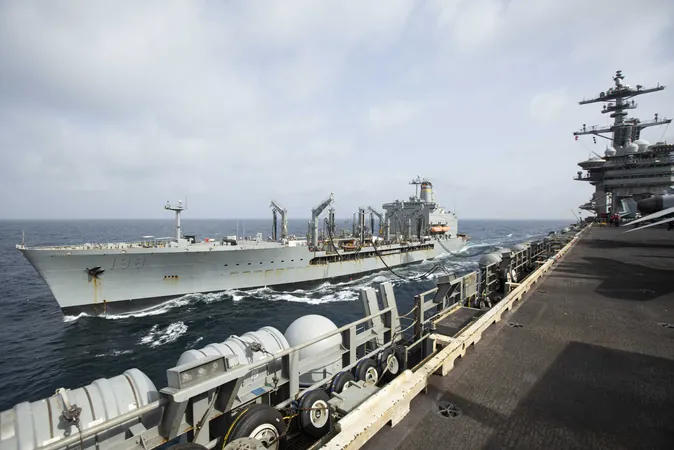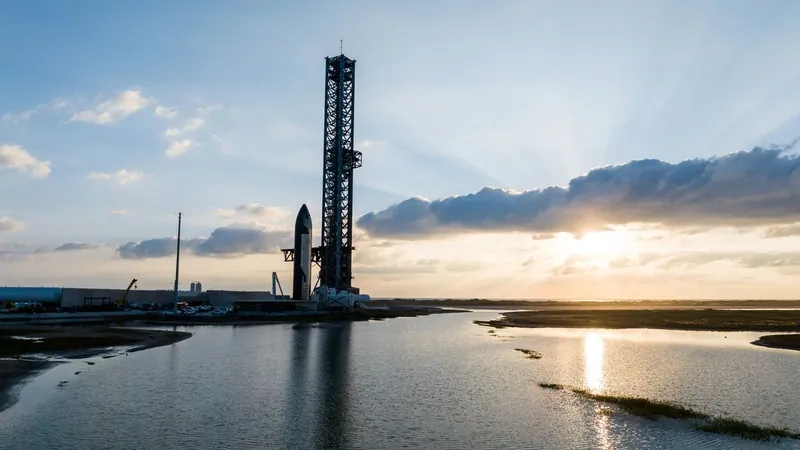
USNS Big Horn Damaged: What Does This Mean for U.S. Naval Operations in the Middle East?
2024-09-24
Author: Sophie
USNS Big Horn: Key Details
In a worrying development, a U.S. Navy replenishment ship, the USNS Big Horn, has sustained damage while on a mission in the tumultuous waters of the Middle East. The ship, crucial for fueling and supplying the USS Abraham Lincoln aircraft carrier strike group, remains operational as tensions continue to escalate due to the ongoing Israel-Palestinian conflict and Israel's retaliatory strikes on Hezbollah in Lebanon.
Incident Overview
Although the exact details surrounding the incident are still under investigation, a Navy official confirmed that the crew aboard the Big Horn is safe, and there is no indication of an oil leak from the vessel. However, the official was tight-lipped about the precise location of the incident, only confirming that it occurred within the broader Middle East region.
Maritime Security Measures
As a precautionary measure, additional military assets have been dispatched to ensure maritime security and prevent further provocations from groups like Hezbollah. The Big Horn typically has around 80 civilians and a complement of five military personnel on board, underscoring its importance in maintaining U.S. naval capabilities.
Speculations and Concerns
Speculation regarding the ship's damage has begun to surface, with unconfirmed reports from maritime tracking site gCaptain suggesting that the Big Horn may have 'run aground' and partially flooded near the coast of Oman. While these claims are yet to be substantiated, they have raised alarms about the ship's structural integrity and the subsequent impact on U.S. naval operations in an already volatile area.
Role of USNS Big Horn
The USNS Big Horn is a Henry J. Kaiser-class fleet replenishment oiler, playing an essential role in supporting extended naval operations, especially in the Arabian Sea. This ship is designed specifically to resupply fuel and goods to various naval vessels, ensuring that carrier strikes like that of the USS Abraham Lincoln can sustain their presence at sea without frequent trips back to port.
Importance of Replenishment Operations
While the USS Abraham Lincoln is a nuclear-powered carrier, many of the vessels in its strike group rely on fossil fuels and thus require ongoing resupply operations. Additionally, the Lincoln’s aircraft depend on regular refueling, making the role of support vessels like the Big Horn indispensable.
Historical Significance
Historically, replenishment oilers like the Big Horn have been crucial for maintaining the U.S. Navy's global reach and operational effectiveness. With civilian crews operated under the U.S. Navy's Military Sealift Command, these ships provide the logistical backbone that allows aircraft carriers and other warships to remain deployed for extended periods without the need to return to shore.
Future Implications
As the Navy looks into the incident, questions arise about contingency plans. If the Big Horn requires significant repairs, the availability of alternative replenishment vessels in the region could prove critical. The absence of backup oilers might lead to serious logistical challenges, potentially impacting military operations at a time when a robust U.S. presence is essential.
Conclusion
Stay tuned for more updates as this story develops—what does this mean for American military strategies in an increasingly perilous Middle East?









 Brasil (PT)
Brasil (PT)
 Canada (EN)
Canada (EN)
 Chile (ES)
Chile (ES)
 España (ES)
España (ES)
 France (FR)
France (FR)
 Hong Kong (EN)
Hong Kong (EN)
 Italia (IT)
Italia (IT)
 日本 (JA)
日本 (JA)
 Magyarország (HU)
Magyarország (HU)
 Norge (NO)
Norge (NO)
 Polska (PL)
Polska (PL)
 Schweiz (DE)
Schweiz (DE)
 Singapore (EN)
Singapore (EN)
 Sverige (SV)
Sverige (SV)
 Suomi (FI)
Suomi (FI)
 Türkiye (TR)
Türkiye (TR)